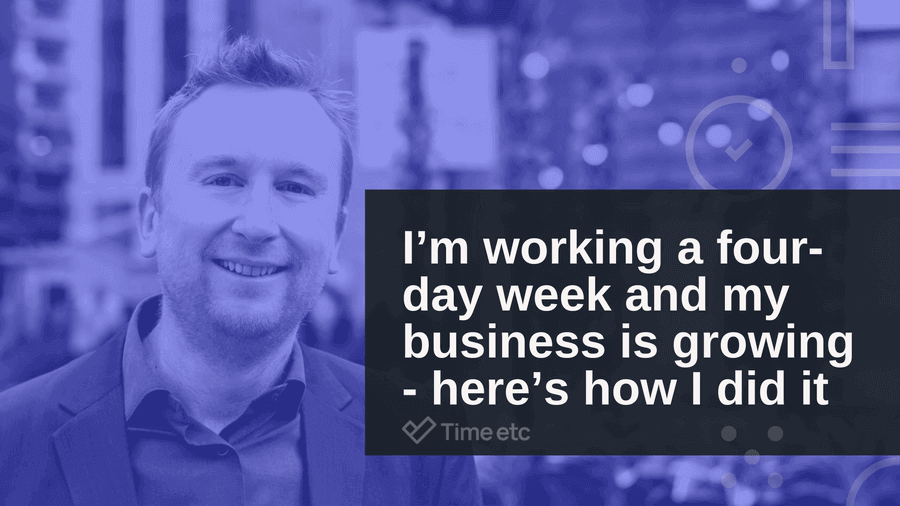The “no pain, no gain” spiel might work at the gym, but it doesn’t apply to success in business.
While it’s true that you need discipline, consistency, and hard work to scale a company, you don’t have to sacrifice every second of your life to work to the detriment of your relationships and health.
How do I know? Because I managed to cut down to a four-day working week whilst running a business that grew by 65% last year and is now into 8-figure annual revenue. And it’s not because I’ve retired or appointed a CEO. I’m still fully operational as the founder of the business and I’m still very hands-on.
Let me tell you how I did it.
1. Don’t tolerate time-wasters
Think about your typical day at the office. You get some things done, sure, but how much of your day is spent on irrelevant or less-important tasks? If your end goal is to reduce the time you spend in the office to spend more time with your family as I have, you need to make every hour count. And the only way to make them count is by spending them wisely.
The best way to do this, by far, is to delegate time-wasting tasks. I have to be very harsh with any task that could waste my time, so I delegate many jobs to other people, including my Time etc virtual assistants.
One of the most common reasons why many business owners don’t delegate is the belief that no other employee could do the job the way that you would. Others might feel as if delegation reflects poorly on their work ethic.
Personally, I’ve had to get over feelings of guilt around delegating. But communicating with your staff to help support them is a crucial leadership skill for any entrepreneur to learn.
So how do you know which tasks are important and which ones are time-wasters? Before adding any tasks to your to-do list, ask yourself these questions:
- Is it crucial for you to do the task? Are you the only person with the knowledge or skills needed to do it?
- Is it your responsibility?
- Why should it go on your to-do list? Before you add it to your schedule, justify how it benefits you or your business
By determining what your responsibilities are, being clear about why you do each task, and delegating the rest, you can be firm about which tasks get your attention to make the most out of your workday.
2. Learn to say no
Saying “no” puts you on the spot and makes way to potential disagreement or confrontation. So, for many, saying “yes” to something they’d rather not do is preferable to the conflict that comes from saying “no.”
And I’ve found that most times I don’t have to just say “no” to others — I also have to say it to myself. Your brain gets a dopamine hit when you complete a task. So if you’re not careful, it’s easy to spend your day doing tasks you shouldn’t be doing because they’re easier and more dopamine-generating than the more important work you really should be doing. It might not feel like it, but it is a form of procrastination.
Having your own business means setting your own hours. The downside of this flexibility is that it blurs the lines between personal time and work, as well as the type of work you accept. More often than not, you end up taking on extra responsibilities and saying "yes" to too many things.
So, learn to set firm boundaries around your time to make each second in work as impactful and productive as possible. Entrepreneur and author Peter Voogd said it best: “The more you protect your time, the more valuable it becomes.”
With setting boundaries, you’ll have to say “no” more often. Enforcing new boundaries can feel strange at first if you’re not used to it. If you find it hard to say “no” because you feel you’re letting people down or missing out on opportunities, behavioral investigator and author Vanessa Van Edwards has given three tips that can help you feel more comfortable and confident setting boundaries:
- Delay your answer. Instead of giving an answer right away, tell the person you need to check your schedule and ask them to email or text you their request.
- Don’t offer explanations. When you add an explanation to your ‘no,’ you give people the chance to challenge your justification, putting you in a difficult position to maintain your original refusal.
- Offer an alternative. For example, refuse the invitation to be a speaker at a friend’s event, but share the name of a contact who might be interested.
3. Never waste your time on email
On average, office workers check their emails 15 times a day, receive “at least 200 messages a day and spend about two-and-a-half hours reading and replying to emails.”
Email itself is not evil. It’s a fantastic way of communication that allows you to keep important information and decisions in writing, but it can be a time-waster if you let it control you. What you need to do with your email is remove its ability to distract you and take away from your productivity throughout the day. If you let it, email will consume hours of your time each day.
Although email apps can be handy for when you are on the go, they can be a big source of distraction day-to-day. The vast majority of emails are not urgent, so they don’t need your attention every time a notification pings on your smartphone or computer.
I’ve found that having a virtual assistant is the best way to stay on top of your email without taking too much of your time. While you’ll still need to reply to some messages, you can let someone else prioritize them and even reply to some of them. I’ve outsourced the processing of all of my emails to my virtual assistant, Lisa. This stops me from constantly being in my inbox during the day.
Lisa organizes my email into priority folders (1, 2, and 3), and once a day I check the priority 1 folder and reply to any urgent emails. Despite running a business with thousands of people involved, I get very few emails because I stopped being an “instant reply” slave to it years ago — so people know to communicate with me via different methods. For me, a quick message on Slack is much easier to deal with than searching for an email in an inbox full of rubbish.
4. Banish distractions
If you’re prone to distraction or procrastination, your brain can, and will, use any excuse to delay tasks that it doesn’t find interesting, or avoid them altogether. Relying on willpower alone to stay focused can be risky. Instead, make sure distractions can’t get to you.
For instance, make sure you have everything you need — apps, documents, pen and paper, gadgets, a snack, or drink — before you get started, so you don’t have to keep getting up and leaving your workspace while you’re in the zone. A study by the University of California Irvine found “it takes an average of 23 minutes and 15 seconds to get back to the task” at hand after getting distracted. So what you think may only be a quick 15-minute social media break could end up being 38 minutes of unproductive time in reality.
Set your phone to voice mail or redirect calls to your assistant. Use distraction-blocking apps to keep you from accessing time-wasting websites and apps. Keep your workspace neat, with only the tools you need for the job.
Apart from very close friends and family members, I screen all my phone calls so I can use the method of communication that’s most efficient for me to get back to you. If you study successful people in leadership roles, this is very common.
5. Schedule your day around your maximum productivity
There are no one-size-fits-all schedules. What works for you will depend on your daily and weekly tasks, your goals, interests, and lifestyle. For instance, a night owl won’t benefit from those popular early morning routines. You can draw inspiration from successful people’s routines, but you still need to adapt them to your particular needs.
How can you do that? Start by observing your own focus and energy levels throughout the day. You can keep track of it with a spreadsheet or a journal if that works for you, but it’s not necessary. Just paying attention to when you do your best work and when you find yourself reaching for another cup of coffee can help you realize your peak times and the slumps where your energy and productivity drops.
Alternatively, you can use apps like Rise or take this test to find out your chronotype, one of the sleep-wake cycle types as described by clinical psychologist and author, Dr. Michael Breus. By learning more about your sleep and energy levels throughout the day, you’re better equipped to create a routine that follows your natural energy flows. For example, if you’ve noticed you take a long time to feel awake in the morning, it’s not a great idea to schedule demanding work or make crucial decisions first thing in the morning.
Rather than working through a list, I plan my day out task-by-task in my calendar around my focus and energy peaks and troughs for different types of work. For example, I do my most creative work between 3pm and 7pm in the evening, so I’ll schedule meetings in the morning to make sure I’m at my best for each task.
Final Thoughts
To run a profitable business, you don’t need to spend every waking moment at work. After all, success should allow you to spend time with family and friends and to take care of yourself. But to reach this point where you are earning more and working less, your work habits must be optimized to ensure you’re making the most out of every hour. Being efficient is the only way you will get everything done.
Implementing this strategy of reducing distractions, setting boundaries, and planning my schedule around my energy for each task has allowed me to do my best work each day. This consistent standard of focus on higher-impact tasks has made it possible to reach my company goals and for my business to thrive. This, in turn, has given me the freedom to devote more time to my family.
Now that you know these tips, you could do the same! Eliminate all the busywork from your life and see how much of a difference it makes.







